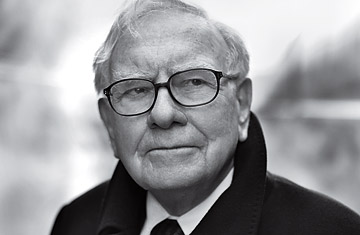
(2 of 9)
Buffett paid a tax rate of only 11% on adjusted gross income of $62,855,038 in 2010. (After deductions, most of which were for charitable contributions, he paid a still low 17% rate on his $39,814,784 of taxable income; his office staff, meanwhile, paid percentages somewhere in the 30s.) Asked if he's ever considered writing a check for what he thought his taxes should have been, he says, "I have thought about that. But what I've thought more about, because Mitch McConnell put it out there, is offering to match the total amount of voluntary contributions made by all Republican members of Congress. And I will. I'll go 1 for 1 with any Republican. And I'll go 3 for 1 with McConnell." He chuckles. "And I'm not worried."
At 81, Buffett says he's in a unique position to speak out. "If you are a CEO or you have to deal with a conservative board or you have a boss that might get upset by what you say, you can't do what I do. But I don't have a boss. It's hard to hurt me. If you don't speak up now, when are you going to? As my partner Charlie told me, it's like saving up sex for your old age!"
AUSTERITY MEASURES
The reason people listen to Buffett, at a time when being the 0.001% may not seem like the best public relations asset, is that in matters of finance he's very often right. But it's also that he's not like other billionaires.
Buffett lives not on an isolated island of wealth but in Omaha, in a shingle-roofed five-bedroom house on an unpretentious street that looks as if it might belong to a successful dentist. He bought it for $31,500 in 1958. The corporation he runs, Berkshire Hathaway, owns 76 businesses--from a candy company to an electric utility--that throw off $1 billion a month in free cash, and he holds major stakes in many of the country's biggest blue-chip firms, including Coca-Cola, American Express, IBM and Procter & Gamble. Yet aside from his indulgence in private air travel (he named his first jet the Indefensible), he estimates his personal yearly expenses to be no more than $150,000. The company canteen in his small office suite, where he has a habit of walking around turning off lights in empty rooms, features a beat-up wooden table, a faux-leather sectional couch and Formica countertops.
His investment habits are as austere as the decor. In an age of leverage, he likes to steer clear of debt, preferring to keep from $10 billion to $20 billion of liquid assets on hand at all times--"so that I can sleep better," he says. In a world of high-frequency traders with two-hour sell windows, Buffett's investment horizon is somewhere between 10 years and forever.
He grew up in Omaha and Washington as the son of a U.S. Congressman and was once president of the University of Pennsylvania's Young Republicans Club. Now he's President Obama's highest-profile supporter, a crusader for higher taxes on the millionaires' club. As he wrote in an op-ed article for the New York Times last summer, in which he noted that his personal tax rate was lower than that of his office staff, Washington needs to "stop coddling the superrich." Millionaires, says Buffett, should pay more taxes--a lot more. And companies certainly shouldn't pay any less.
